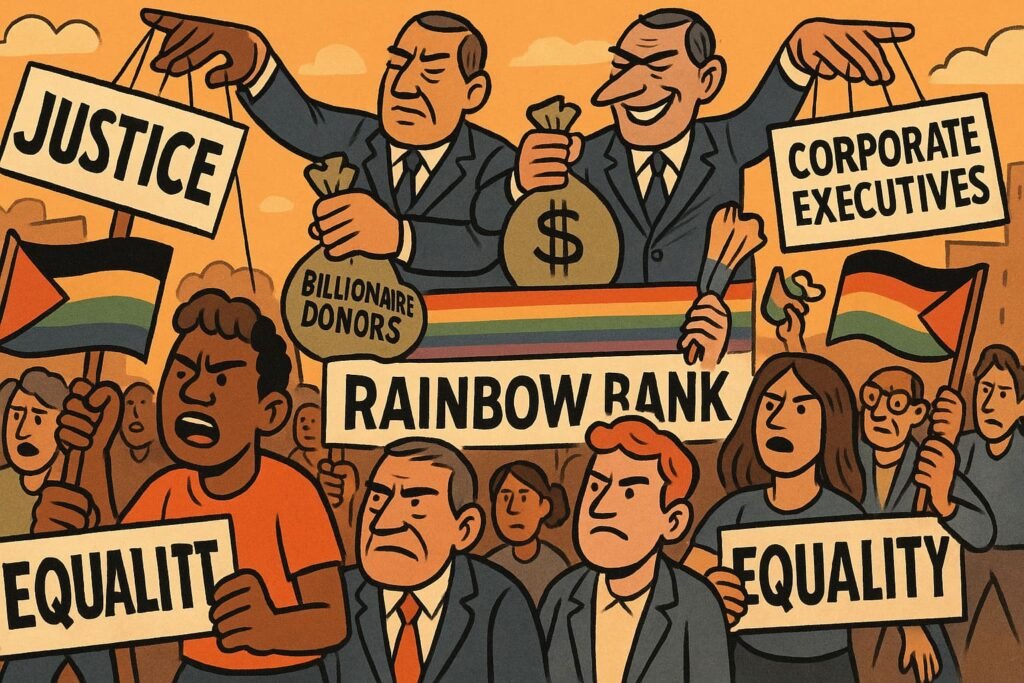Social Justice Funding Explained – Who Pays for the Revolution?
Social justice sounds grassroots: students with placards, activists in the streets, people fighting “the system.” But behind the slogans and hashtags lies a more mundane reality — money. Movements don’t run on vibes alone. Someone prints the banners, pays the organisers, funds the lawsuits, and keeps the lights on in those well-staffed NGOs.
The question nobody asks: who actually pays for the revolution?
Table of contents
From Grassroots to Grant Money
Movements often start small — community groups, student protests, local campaigns. But scaling up requires cash. Enter foundations, NGOs, and donors ready to professionalise “resistance.” What began as passion quickly becomes payroll.
The Role of NGOs and Non-Profits
NGOs are the middlemen of modern activism. They take donations from foundations, governments, and philanthropists, then rebrand them as grassroots campaigns. With professional staff, slick websites, and PR teams, they look like movements of the people — while operating more like consultancies with a cause.
Corporate Sponsorship and Woke Branding
No surprise here: corporations love a good cause when it boosts their image. Pride floats, diversity workshops, “anti-racism” training — all bankrolled by companies that still offshore jobs and dodge taxes. Supporting social justice is cheaper than paying fair wages.
Woke branding isn’t charity; it’s marketing. A rainbow logo costs less than a pay rise.
The ESG Imperative
One of the strongest drivers of corporate funding for social justice comes from ESG ratings — Environmental, Social, and Governance scores. These scores act like credit ratings for corporations: fall short, and you risk losing access to investment.
That’s why companies suddenly fund diversity initiatives, scholarships, and activist causes. It isn’t about generosity. It’s about ticking the right ESG boxes to keep the money flowing.
Even BlackRock’s CEO Larry Fink has admitted it openly:
“You have to force behaviours, and at BlackRock, we are forcing behaviours. If you don’t force behaviours, whether it’s gender or race… you’re going to be impacted.”
In other words: corporate social justice is coerced, not chosen. If you want funding, you perform the activism investors demand.
Government Grants and Public Funds
Activism isn’t just privately funded — taxpayers often pick up the bill. Grants for “community engagement,” “inclusive education,” or “hate speech prevention” funnel money into activist organisations. Public funds meant for civic needs end up financing ideological projects. Resistance, courtesy of the state.
Philanthropy and Billionaire Influence
Behind many movements sit billionaire foundations — Ford, Soros, Gates, Rockefeller. Their money shapes priorities: which causes get visibility, which protests get press, which lawsuits get filed. The irony? Movements supposedly fighting capitalism often survive on capitalist wealth.
Grassroots rage, billionaire-approved.
Who Really Benefits?
- Activists get salaries, platforms, and careers.
- Corporations buy cheap virtue.
- Governments outsource ideology and call it policy.
- Philanthropists get social influence — and tax write-offs.
Ordinary people? They get slogans, hashtags, and rising costs of living.
Consequences of Outsourced Activism
When funding comes from above, priorities change. Movements become less about local concerns and more about donor agendas. Protests look organic but are choreographed. Causes that don’t attract funding — like class struggle — vanish from the stage.
Money doesn’t just fuel activism; it steers it.
Follow the Money, Find the Motives
Social justice movements sell themselves as spontaneous uprisings. In reality, they run on grants, donations, and sponsorships. The higher the funding, the safer the rebellion.
Want to know which causes matter most? Don’t listen to the chants. Follow the money.
👉 Want the full story on how virtue became a business model? Visit our ESG Explainer Hub to see how finance, branding, and compliance turned morality into a market.
FAQ
Who funds social justice movements?
NGOs, corporations, governments, and billionaire philanthropists all play a role.
Why do corporations support activism?
It’s cheap branding. A diversity campaign costs less than fixing inequality.
Are social justice movements really grassroots?
Some start that way, but large-scale activism usually depends on external funding.
What’s the problem with donor influence?
Money can redirect movements away from genuine community needs toward donor-friendly agendas.



